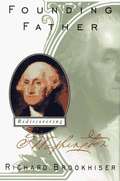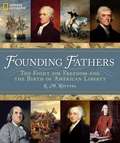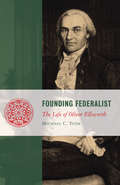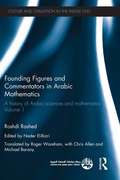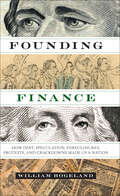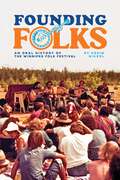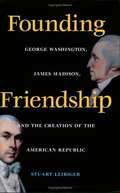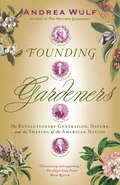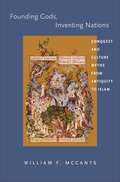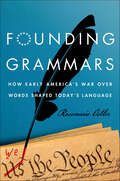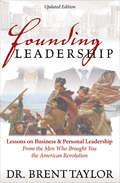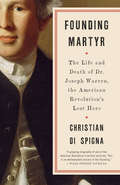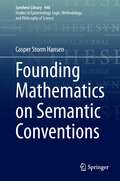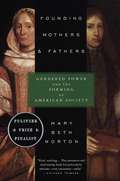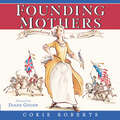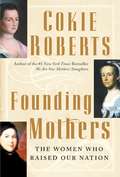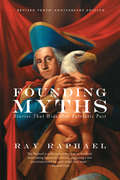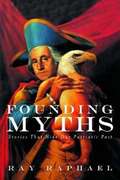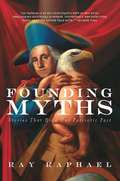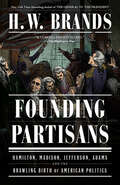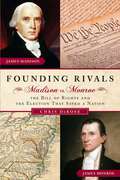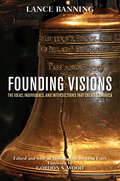- Table View
- List View
Founding Father: Rediscovering George Washington
by Richard BrookhiserIn this thought-provoking look at George Washington as soldier and statesman, Richard Brookhiser traces the astonishing achievements of Washington's career and illuminates how his character and his values shaped the beginnings of American politics.
Founding Fathers: The Fight for Freedom and the Birth of American Liberty
by Jack N. Rakove K. M. KostyalKostyal tells the story of the great American heroes who created the Declaration of Independence, fought the American Revolution, shaped the US Constitution--and changed the world. The era's dramatic events, from the riotous streets in Boston to the unlikely victory at Saratoga, are punctuated with lavishly illustrated biographies of the key founders--Alexander Hamilton, John Adams, Ben Franklin, Thomas Paine, Thomas Jefferson, George Washington, and James Madison--who shaped the very idea of America. An introduction and ten expertly-rendered National Geographic maps round out this ideal gift for history buff and student alike. Filled with beautiful illustrations, maps, and inspired accounts from the men and women who made America, Founding Fathers brings the birth of the new nation to light.
Founding Federalist: The Life of Oliver Ellsworth (Lives Of The Founders Ser.)
by Michael TothIn Founding Federalist, Michael C. Toth provides an in-depth look at the life and work of Oliver Ellsworth, a largely forgotten but eminently important Founding Father.The American Founding was the work of visionaries and revolutionaries. But amid the celebrated luminaries, the historic transformations, the heroic acts, and unforgettable discourses were practical politicians, the consensus builders who made the system work. Oliver Ellsworth--Framer, senator, chief justice, diplomat--was such a leader.Founding Federalist brings to life a figure whose contributions shape American political life even today. Vividly capturing the pivotal debates at Philadelphia in the summer of 1787, Toth shows how Ellsworth was a vital force in shaping the Constitution as a Federalist document, one that did not extinguish the role of the states even as it recognized the need for national institutions. The author illuminates what Ellsworth and other Founders understood to be the meaning of the new constitutional order--a topic highly relevant to twenty-first-century debates about the role of government. Toth, an attorney, also brilliantly analyzes Ellsworth's most important legislative achievement: the creation of the U.S. federal court system.With this insightful new biography, Michael Toth has reclaimed a figure who made crucial contributions to a lasting creation: a federal republic.
Founding Feuds: The Rivalries, Clashes, and Conflicts That Forged a Nation
by Paul AronThe Founding Fathers have been hailed for centuries as shining examples of men who put aside their own agendas to found a nation. But behind the scenes, there were more petty fights and fraught relationships than signatures on the Declaration of Independence. From the violent brawl between Roger Griswold and Matthew Lyon in the halls of Congress, to George Washington's battle against his slave Harry Washington, these less-discussed clashes bring to light the unpredictable and volatile nature of a constantly changing nation. Additionally, this gripping narrative delves deeper into the famous feuds, such as the fatal duel of Alexander Hamilton and Aaron Burr, and the many rivalries of Thomas Jefferson (which were as often personal as political.)America's great forbearers fought with each other as bitterly as our politicians do today. Founding Feuds reveals the true natures of the Founding Fathers and how their infighting shaped our nation as much as their cooperation, in fact sometimes even for the better.
Founding Figures and Commentators in Arabic Mathematics: A History of Arabic Sciences and Mathematics Volume 1 (Culture and Civilization in the Middle East)
by Roshdi RashedIn this unique insight into the history and philosophy of mathematics and science in the mediaeval Arab world, the eminent scholar Roshdi Rashed illuminates the various historical, textual and epistemic threads that underpinned the history of Arabic mathematical and scientific knowledge up to the seventeenth century. The first of five wide-ranging and comprehensive volumes, this book provides a detailed exploration of Arabic mathematics and sciences in the ninth and tenth centuries. Extensive and detailed analyses and annotations support a number of key Arabic texts, which are translated here into English for the first time. In this volume Rashed focuses on the traditions of celebrated polymaths from the ninth and tenth centuries ‘School of Baghdad’ - such as the Banū Mūsā, Thābit ibn Qurra, Ibrāhīm ibn Sinān, Abū Ja´far al-Khāzin, Abū Sahl Wayjan ibn Rustām al-Qūhī - and eleventh-century Andalusian mathematicians like Abū al-Qāsim ibn al-Samh, and al-Mu’taman ibn Hūd. The Archimedean-Apollonian traditions of these polymaths are thematically explored to illustrate the historical and epistemological development of ‘infinitesimal mathematics’ as it became more clearly articulated in the eleventh-century influential legacy of al-Hasan ibn al-Haytham (‘Alhazen’). Contributing to a more informed and balanced understanding of the internal currents of the history of mathematics and the exact sciences in Islam, and of its adaptive interpretation and assimilation in the European context, this fundamental text will appeal to historians of ideas, epistemologists, mathematicians at the most advanced levels of research.
Founding Finance: How Debt, Speculation, Foreclosures, Protests, and Crackdowns Made Us a Nation (Discovering America)
by William HogelandThe author of The Whiskey Rebellion “dig[s] beneath history’s surface and note[s] both the populist and anti-populist dimensions of the nation’s founding” (Library Journal).Recent movements such as the Tea Party and anti-tax “constitutional conservatism” lay claim to the finance and taxation ideas of America’s founders, but how much do we really know about the dramatic clashes over finance and economics that marked the founding of America? Dissenting from both right-wing claims and certain liberal preconceptions, Founding Finance brings to life the violent conflicts over economics, class, and finance that played directly, and in many ways ironically, into the hardball politics of forming the nation and ratifying the Constitution—conflicts that still continue to affect our politics, legislation, and debate today.Mixing lively narrative with fresh views of America’s founders, William Hogeland offers a new perspective on America’s economic infancy: foreclosure crises that make our current one look mild; investment bubbles in land and securities that drove rich men to high-risk borrowing and mad displays of ostentation before dropping them into debtors’ prisons; depressions longer and deeper than the great one of the twentieth century; crony mercantilism, war profiteering, and government corruption that undermine any nostalgia for a virtuous early republic; and predatory lending of scarce cash at exorbitant, unregulated rates, which forced people into bankruptcy, landlessness, and working in the factories and on the commercial farms of their creditors. This story exposes and corrects a perpetual historical denial—by movements across the political spectrum—of America’s all-important founding economic clashes, a denial that weakens and cheapens public discourse on American finance just when we need it most.
Founding Finance: How Debt, Speculation, Foreclosures, Protests, and Crackdowns Made Us a Nation (Discovering America)
by William HogelandRecent movements such as the Tea Party and anti-tax “constitutional conservatism” lay claim to the finance and taxation ideas of America’s founders, but how much do we really know about the dramatic clashes over finance and economics that marked the founding of America? Dissenting from both right-wing claims and certain liberal preconceptions, Founding Finance brings to life the violent conflicts over economics, class, and finance that played directly, and in many ways ironically, into the hardball politics of forming the nation and ratifying the Constitution—conflicts that still continue to affect our politics, legislation, and debate today. Mixing lively narrative with fresh views of America’s founders, William Hogeland offers a new perspective on America’s economic infancy: foreclosure crises that make our current one look mild; investment bubbles in land and securities that drove rich men to high-risk borrowing and mad displays of ostentation before dropping them into debtors’ prisons; depressions longer and deeper than the great one of the twentieth century; crony mercantilism, war profiteering, and government corruption that undermine any nostalgia for a virtuous early republic; and predatory lending of scarce cash at exorbitant, unregulated rates, which forced people into bankruptcy, landlessness, and working in the factories and on the commercial farms of their creditors. This story exposes and corrects a perpetual historical denial—by movements across the political spectrum—of America’s all-important founding economic clashes, a denial that weakens and cheapens public discourse on American finance just when we need it most.
Founding Folks: An Oral History of the Winnipeg Folk Festival
by Kevin NikkelThe story of the Winnipeg Folk Festival, from the folks who were there Every July since 1974, Manitoba’s Birds Hill Provincial Park has been home to one of Canada’s most vibrant and storied celebrations of folk music—the Winnipeg Folk Festival. Founding Folks tells the festival’s origin story, from founder Mitch Podolak’s unlikely dream of bringing folk music to prairie stages to how it became one of the most influential Folk Festivals in North America. Through conversations with staff, volunteers, and musicians—including Bruce Cockburn, Tom Jackson, and David Amram—filmmaker Kevin Nikkel offers a nuanced look at community building, explores the relationships between politics and culture, and provides fascinating insight into the lifelong friendships that developed among some of folk music’s most defining figures. Brought to life by more than ninety photographs, this book is a testament to the vitality of prairie arts and culture. Founding Folks captures the spirit and enthusiasm of those early festival days and preserves this legacy for festival goers, students of culture and history, music enthusiasts, and folkies everywhere.
Founding Friendship: George Washington, James Madison, and the Creation of the American Republic
by Stuart LeibigerAlthough the friendship between George Washington and James Madison was eclipsed in the early 1790s by the alliances of Madison with Jefferson and Washington with Hamilton, their collaboration remains central to the constitutional revolution that launched the American experiment in republican government. Washington relied heavily on Madison's advice, pen, and legislative skill, while Madison found Washington's prestige indispensable for achieving his goals for the new nation. Together, Stuart Leibiger argues, Washington and Madison struggled to conceptualize a political framework that would respond to the majority without violating minority rights. Stubbornly refusing to sacrifice either of these objectives, they cooperated in helping to build and implement a powerful, extremely republican constitution.Observing Washington and Madison in light of their special relationship, Leibiger argues against a series of misconceptions about the two men. Madison emerges as neither a strong nationalist of the Hamiltonian variety nor a political consolidationist; he did not retreat from nationalism to states' rights in the 1790s, as other historians have charged. Washington, far from being a majestic figurehead, exhibits a strong constitutional vision and firm control of his administration.By examining closely Washington and Madison's correspondence and personal visits, Leibiger shows how a marriage of political convenience between two members of the Chesapeake elite grew into a genuine companionship fostered by historical events and a mutual interest in agriculture and science. The development of their friendship, and eventual estrangement, mirrors in fascinating ways the political development of the early Republic.
Founding Gardeners: How the Revolutionary Generation Created an American Eden
by Andrea WulfFrom the author of the acclaimed The Brother Gardeners, a fascinating look at the founding fathers from the unique and intimate perspective of their lives as gardeners, plantsmen, and farmers. For the founding fathers, gardening, agriculture, and botany were elemental passions, as deeply ingrained in their characters as their belief in liberty for the nation they were creating. Andrea Wulf reveals for the first time this aspect of the revolutionary generation. She describes how, even as British ships gathered off Staten Island, George Washington wrote his estate manager about the garden at Mount Vernon; how a tour of English gardens renewed Thomas Jefferson's and John Adams's faith in their fledgling nation; how a trip to the great botanist John Bartram's garden helped the delegates of the Constitutional Congress break their deadlock; and why James Madison is the forgotten father of American environmentalism. These and other stories reveal a guiding but previously overlooked ideology of the American Revolution. Founding Gardeners adds depth and nuance to our understanding of the American experiment and provides us with a portrait of the founding fathers as they've never before been seen.
Founding Gods, Inventing Nations: Conquest and Culture Myths from Antiquity to Islam
by William F. McCantsFrom the dawn of writing in Sumer to the sunset of the Islamic empire, Founding Gods, Inventing Nations traces four thousand years of speculation on the origins of civilization. Investigating a vast range of primary sources, some of which are translated here for the first time, and focusing on the dynamic influence of the Greek, Roman, and Arab conquests of the Near East, William McCants looks at the ways the conquerors and those they conquered reshaped their myths of civilization's origins in response to the social and political consequences of empire. The Greek and Roman conquests brought with them a learned culture that competed with that of native elites. The conquering Arabs, in contrast, had no learned culture, which led to three hundred years of Muslim competition over the cultural orientation of Islam, a contest reflected in the culture myths of that time. What we know today as Islamic culture is the product of this contest, whose protagonists drew heavily on the lore of non-Arab and pagan antiquity. McCants argues that authors in all three periods did not write about civilization's origins solely out of pure antiquarian interest--they also sought to address the social and political tensions of the day. The strategies they employed and the postcolonial dilemmas they confronted provide invaluable context for understanding how authors today use myth and history to locate themselves in the confusing aftermath of empire.
Founding Grammars: How Early America's War Over Words Shaped Today's Language
by Rosemarie OstlerA “lively and revealing” history of America’s obsession with grammar—from the debate over double negatives to the influence of frontier vernacular (Kirkus Reviews).Standard grammar and accurate spelling are widely considered hallmarks of a good education, but their exact definitions are much more contentious—capable of inciting a full-blown grammar war at the splice of a comma. With an accessible and enthusiastic approach, Ostler considers these grammatical shibboleths, tracing current debates back to America’s earliest days, an era when most families owned only two books—the Bible and a grammar primer.Along the way, she investigates colorful historical characters on both sides of the grammar debate in her efforts to unmask the origins of contemporary speech. Linguistic founding fathers like Noah Webster, Tory expatriate Lindley Murray, and post-Civil War literary critic Richard Grant White, all play a featured role in creating the rules we’ve come to use, and occasionally discard, throughout the years. Founding Grammars is for curious readers who want to know where grammar rules have come from, where they’ve been, and where they might go next.
Founding Leadership: Lessons on Business & Personal Leadership From the Men Who Brought You the American Revolution
by Dr. Brent TaylorWhat would Washington (or Jefferson or Hamilton) do? Practical leadership lessons from the eighteenth century that you can use today. To many, the leaders of the American Revolution are distant men of myth—stoic, heroic, and unknowable. People take for granted that these men were brilliant, but rarely ask why. What distinguished them from their fellow citizens, both then and now? What can they teach about leadership, and about realizing both career and personal goals? Founding Leadership reveals the human side of these &“marble men,&” examining the words, deeds, and personal qualities that allowed Washington, Jefferson, Adams, Hamilton, and others to achieve their utopian aims. Historian Brent Taylor demonstrates that effective leadership requires more than perseverance and a laundry list of how-to steps. It requires leaders to conceive visions greater than themselves, then communicate those visions in ways that inspire, persuade, and motivate others. In examining historical episodes both famous and obscure, Taylor uncovers the light and dark sides of power, including the motivations behind Benedict Arnold&’s infamous betrayal. Through these fascinating studies, you can become more attuned to America&’s past and—most importantly—to your own leadership potential.
Founding Martyr: The Life and Death of Dr. Joseph Warren, the American Revolution's Lost Hero
by Christian Di SpignaA rich and illuminating biography of America’s forgotten Founding Father, the patriot physician and major general who fomented rebellion and died heroically at the battle of Bunker Hill on the brink of revolutionLittle has been known of one of the most important figures in early American history, Dr. Joseph Warren, an architect of the colonial rebellion, and a man who might have led the country as Washington or Jefferson did had he not been martyred at Bunker Hill in 1775. Warren was involved in almost every major insurrectionary act in the Boston area for a decade, from the Stamp Act protests to the Boston Massacre to the Boston Tea Party, and his incendiary writings included the famous Suffolk Resolves, which helped unite the colonies against Britain and inspired the Declaration of Independence. Yet after his death, his life and legend faded, leaving his contemporaries to rise to fame in his place and obscuring his essential role in bringing America to independence.Christian Di Spigna’s definitive new biography of Warren is a loving work of historical excavation, the product of two decades of research and scores of newly unearthed primary-source documents that have given us this forgotten Founding Father anew. Following Warren from his farming childhood and years at Harvard through his professional success and political radicalization to his role in sparking the rebellion, Di Spigna’s thoughtful, judicious retelling not only restores Warren to his rightful place in the pantheon of Revolutionary greats, it deepens our understanding of the nation’s dramatic beginnings.
Founding Mathematics on Semantic Conventions (Synthese Library #446)
by Casper Storm HansenThis book presents a new nominalistic philosophy of mathematics: semantic conventionalism. Its central thesis is that mathematics should be founded on the human ability to create language – and specifically, the ability to institute conventions for the truth conditions of sentences.This philosophical stance leads to an alternative way of practicing mathematics: instead of “building” objects out of sets, a mathematician should introduce new syntactical sentence types, together with their truth conditions, as he or she develops a theory.Semantic conventionalism is justified first through criticism of Cantorian set theory, intuitionism, logicism, and predicativism; then on its own terms; and finally, exemplified by a detailed reconstruction of arithmetic and real analysis.Also included is a simple solution to the liar paradox and the other paradoxes that have traditionally been recognized as semantic. And since it is argued that mathematics is semantics, this solution also applies to Russell’s paradox and the other mathematical paradoxes of self-reference.In addition to philosophers who care about the metaphysics and epistemology of mathematics or the paradoxes of self-reference, this book should appeal to mathematicians interested in alternative approaches.
Founding Mothers & Fathers: Gendered Power and the Forming of American Society
by Mary Beth NortonMuch like A Midwife's Tale and The Unredeemed Captive, this novel is about power relationships in early American society, religion, and politics--with insights into the initial development and operation of government, the maintenance of social order, and the experiences of individual men and women.From the Hardcover edition.
Founding Mothers: Remembering the Ladies
by Cokie Roberts#1 New York Times bestselling author and celebrated journalist Cokie Roberts brings young readers a stunning nonfiction picture book that highlights the female patriots of the American Revolution. This nonfiction picture book is an excellent choice to share during homeschooling, in particular for children ages 4 to 6. It’s a fun way to learn to read and as a supplement for activity books for children.Beautifully illustrated by Caldecott Honor–winning artist Diane Goode, Founding Mothers: Remembering the Ladies reveals the incredible accomplishments of the women who orchestrated the American Revolution behind the scenes.Roberts traces the stories of heroic, patriotic women such as Abigail Adams, Martha Washington, Phillis Wheatley, Mercy Otis Warren, Sarah Livingston Jay, and others. Details are gleaned from their letters, private journals, lists, and ledgers. The bravery of these women’s courageous acts contributed to the founding of America and spurred the founding fathers to make this a country that “remembered the ladies.”This compelling book, based on the author's acclaimed work for adults, Founding Mothers, includes a rich time line, biographies, an author’s note, and additional web resources in the back matter. Parents and educators looking for a more in-depth book beyond the Rosie Revere and Rad Women series will welcome Founding Mothers.
Founding Mothers: The Women Who Raised Our Nation
by Cokie RobertsCokie Roberts's number one New York Times bestseller, We Are Our Mothers' Daughters, examined the nature of women's roles throughout history and led USA Today to praise her as a "custodian of time-honored values." Her second bestseller, From This Day Forward, written with her husband, Steve Roberts, described American marriages throughout history, including the romance of John and Abigail Adams. Now Roberts returns with Founding Mothers, an intimate and illuminating look at the fervently patriotic and passionate women whose tireless pursuits on behalf of their families -- and their country -- proved just as crucial to the forging of a new nation as the rebellion that established it.While much has been written about the men who signed the Declaration of Independence, battled the British, and framed the Constitution, the wives, mothers, sisters, and daughters they left behind have been little noticed by history. Roberts brings us the women who fought the Revolution as valiantly as the men, often defending their very doorsteps. While the men went off to war or to Congress, the women managed their businesses, raised their children, provided them with political advice, and made it possible for the men to do what they did. The behind-the-scenes influence of these women -- and their sometimes very public activities -- was intelligent and pervasive.Drawing upon personal correspondence, private journals, and even favored recipes, Roberts reveals the often surprising stories of these fascinating women, bringing to life the everyday trials and extraordinary triumphs of individuals like Abigail Adams, Mercy Otis Warren, Deborah Read Franklin, Eliza Pinckney, Catherine Littlefield Green, Esther DeBerdt Reed, and Martha Washington -- proving that without our exemplary women, the new country might never have survived.Social history at its best, Founding Mothers unveils the drive, determination, creative insight, and passion of the other patriots, the women who raised our nation. Roberts proves beyond a doubt that like every generation of American women that has followed, the founding mothers used the unique gifts of their gender -- courage, pluck, sadness, joy, energy, grace, sensitivity, and humor -- to do what women do best, put one foot in front of the other in remarkable circumstances and carry on.
Founding Myths
by Ray RaphaelFirst published ten years ago, award-winning historian Ray Raphael's Founding Myths has since established itself as a landmark of historical myth-busting. With the author's trademark wit and flair, Founding Myths exposes the errors and inventions in America's most cherished tales, from Paul Revere's famous ride to Patrick Henry's "Liberty or Death" speech. For the seventy thousand readers who have been captivated by Raphael's eye-opening accounts, history has never been the same.In this revised tenth-anniversary edition, Raphael revisits the original myths and explores their further evolution over the past decade, uncovering new stories and peeling back additional layers of misinformation. This new edition also examines the highly politicized debates over America's past, as well as how school textbooks and popular histories often reinforce rather than correct historical mistakes.A book that "explores the truth behind the stories of the making of our nation" (National Public Radio), this revised edition of Founding Myths will be a welcome resource for anyone seeking to separate historical fact from fiction.
Founding Myths: Stories That Hide Our Patriotic Past
by Ray RaphaelRaphael questions the validity of the legend of Paul Revere's ride, Thomas Jefferson's status as the architect of American equality, and the existence of Molly Pitcher.
Founding Myths: Stories That Hide Our Patriotic Past
by Ray RaphaelWith wit and flair, Founding Myths exposes the errors and inventions in thirteen of America's most cherished tales, from Paul Revere's famous ride to Patrick Henry's "Liberty or Death" speech. Exploring the dynamic intersection between history-making and story-making, award-winning author and historian Ray Raphael shows how these fictions--conceived in the narrowly nationalistic politics of the nineteenth century--undermine our democratic ideals.
Founding Partisans: Hamilton, Madison, Jefferson, Adams and the Brawling Birth of American Politics
by H. W. BrandsFrom bestselling historian and Pulitzer Prize finalist H.W. Brands, a revelatory history of the shocking emergence of vicious political division at the birth of the United States.To the framers of the Constitution, political parties were a fatal threat to republican virtues. They had suffered the consequences of partisan politics in Britain before the American Revolution, and they wanted nothing similar for America. Yet parties emerged even before the Constitution was ratified, and they took firmer root in the following decade. In Founding Partisans, master historian H. W. Brands has crafted a fresh and lively narrative of the early years of the republic as the Founding Fathers fought one another with competing visions of what our nation would be.The first party, the Federalists, formed around Alexander Hamilton, James Madison and their efforts to overthrow the Articles of Confederation and make the federal government more robust. Their opponents organized as the Antifederalists, who feared the corruption and encroachments on liberty that a strong central government would surely bring. The Antifederalists lost but regrouped under the new Constitution as the Republicans, led by Thomas Jefferson, whose bruising contest against Federalist John Adams marked the climax of this turbulent chapter of American political history. The country&’s first years unfolded in a contentious spiral of ugly elections and blatant violations of the Constitution. Still, peaceful transfers of power continued, and the nascent country made its way towards global dominance, against all odds. Founding Partisans is a powerful reminder that fierce partisanship is a problem as old as the republic.
Founding Rivals: Madison vs. Monroe, The Bill of Rights, and The Election that Saved a Nation
by Chris DeroseThe Amazing True Story of the Election That Saved the ConstitutionIn 1789, James Madison and James Monroe ran against each other for Congress--the only time that two future presidents have contested a congressional seat.But what was at stake, as author Chris DeRose reveals in Founding Rivals: Madison vs. Monroe, the Bill of Rights, and the Election That Saved a Nation, was more than personal ambition. <P><P>This was a race that determined the future of the Constitution, the Bill of Rights, the very definition of the United States of America.Friends and political allies for most of their lives, Madison was the Constitution's principal author, Monroe one of its leading opponents. Monroe thought the Constitution gave the federal government too much power and failed to guarantee fundamental rights. Madison believed that without the Constitution, the United States would not survive.It was the most important congressional race in American history, more important than all but a few presidential elections, and yet it is one that historians have virtually ignored. <P><P>In Founding Rivals, DeRose, himself a political strategist who has fought campaigns in Madison and Monroe's district, relives the campaign, retraces the candidates' footsteps, and offers the first insightful, comprehensive history of this high-stakes political battle. <P><P>DeRose reveals: <br>How Madison's election ensured the passage of a Bill of Rights--and how Monroe's election would have ensured its failure <br>How Madison came from behind to win a narrow victory (by a margin of only 336 votes) in a district gerrymandered against him <br>How the Bill of Rights emerged as a campaign promise to Virginia's evangelical Christians <br>Why Madison's defeat might have led to a new Constitutional Convention--and the breakup of the United States <br>Founding Rivals tells the extraordinary, neglected story of two of America's most important Founding Fathers. Brought to life by unparalleled research, it is one of the most provocative books of American political history you will read this year.
Founding St. Louis: First City of the New West
by J. Frederick FauszThe animal wealth of the western "wilderness" provided by talented "savages" encouraged French-Americans from Illinois, Canada and Louisiana to found a cosmopolitan center of international commerce that was a model of multicultural harmony. Historian J. Frederick Fausz offers a fresh interpretation of Saint Louis from 1764 to 1804, explaining how Pierre Lacl de, the early Chouteaus, Saint Ange de Bellerive and the Osage Indians established a "gateway" to an enlightened, alternative frontier of peace and prosperity before Lewis and Clark were even born. Historians, genealogists and general readers will appreciate the well-researched perspectives in this engaging story about a novel French West long ignored in American History.
Founding Visions: The Ideas, Individuals, and Intersections that Created America
by Lance Banning“Banning’s skill as an essayist shines” in this collection of writing on the foundation of the American republic (San Francisco Book Review).Lance Banning was assembling this collection of his best and most representative writings on the Founding era when his untimely death stalled the project just short of its completion. Now, thanks to the efforts of editor Todd Estes, this illuminating resource is finally available. Founding Visions showcases the work of a historian who shaped the intellectual debates of his time. Featuring a foreword by Gordon S. Wood, the volume presents Banning’s most seminal and insightful essays to a new generation of students, scholars, and general readers.“Lance Banning’s balanced but penetrating view of historical materials makes him a vital mediator in scholarly disputes, one who knows how to bring light rather than heat to controversies better understood as joint contributions. . . . Every historian, whether beginning or advanced, will benefit from reading this book.” —Robert A. Ferguson, Columbia University, author of Reading the Early Republic“Banning’s impeccable scholarship has shaped the way we think about early American history, and the essays in this volume show him at the peak of his very considerable powers.” —Peter S. Onuf, Robert H. Smith International Center for Jefferson Studies, author of The Origins of the Federal Republic: Jurisdictional Controversies in the United States, 1775-1787“Exemplary.” —Journal of Southern History“The work represents an impressive collection that is an essential companion to any serious student of the intellectual issues of the early Republic.” —Southern Historian
